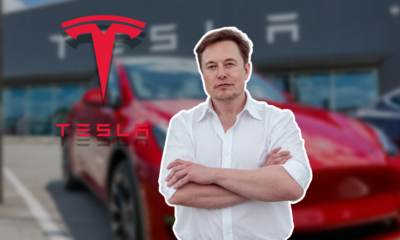Trends
Honda And Nissan To Merge? Japan’s Auto Industry Hits Reset As Tesla And Chinese EVs Take The Lead
Published
10 months agoon

Big news is brewing in Japan’s auto industry! Honda and Nissan, two of the country’s iconic carmakers, are reportedly gearing up for merger talks. It’s a move that could shake up the auto world, as these longtime rivals join forces to tackle the growing challenges of the electric vehicle (EV) era.
Why now?
Well, the pressure is mounting. Tesla is dominating the EV scene in the US and Europe, while Chinese automakers, led by BYD, are making waves in Asia—especially in China, the world’s largest car market. Japanese cars, once the gold standard globally, are now struggling to maintain their foothold, particularly in EV-friendly markets.
Honda and Nissan are already inching closer, with both companies acknowledging they’re “exploring various possibilities for collaboration.” Word is they’re considering creating a holding company to oversee operations. Mitsubishi Motors, where Nissan owns a 24% stake, could also join the party. This potential supergroup has roots in the alliance era under Carlos Ghosn, the former CEO of Nissan, Renault, and Mitsubishi Motors.
Speaking of Ghosn, his dramatic fall from grace still casts a shadow. Remember how he was ousted amid scandal, jailed in Japan, and then pulled off that wild escape to Lebanon? Interestingly, Renault—still a key Nissan shareholder—seems to be in the dark about these merger talks.
So, what’s driving this potential merger?
For one, financial struggles. Both Honda and Nissan are burning cash on next-gen EVs while their traditional gas-powered cars lose steam thanks to the Osborne effect (when people stop buying current models because they’re waiting for new ones). Nissan, in particular, is in hot water, reportedly with just a few months of cash left.
Meanwhile, Toyota—the giant of Japan’s auto industry—has been slow to jump on the EV bandwagon but is weathering the storm thanks to its massive scale and financial muscle. Honda and Nissan, on the other hand, don’t have that luxury, making consolidation a survival strategy.

Tesla, BYD, and the EV Revolution
Let’s face it – Japanese automakers dropped the ball on electric vehicles (EVs). While companies like Honda and Nissan hesitated, Chinese EV giants like BYD sprinted ahead, fueled by an early pivot to EVs, government backing, and a robust electronics manufacturing ecosystem. Then there’s Tesla, which not only pioneered the EV revolution but also became a household name in the US, Europe, and even China.
Today, the numbers tell the story. Honda’s market cap sits at $38.8 billion, Nissan’s at $7.6 billion. Meanwhile, Tesla? A jaw-dropping $1.49 trillion. To top it off, Elon Musk’s net worth has hit $400 billion, buoyed by Tesla’s meteoric valuation spike following Donald Trump’s re-election. Musk and Trump’s bromance is certainly paying dividends.
Thus, the pressure is on, in part thanks to an EV price war launched by Tesla and China’s BYD. Tesla slashed prices to drive demand, and BYD, with its affordable plug-in hybrids, followed suit. This one-two punch has made life miserable for automakers struggling with costly next-gen EVs while their traditional gas-powered cars lose relevance.
Nissan, in particular, is in hot water. Just last month, it announced plans to cut 9,000 jobs and slash global production capacity by 20%, hoping to save $2.6 billion by March. Honda isn’t exactly thriving either, with analysts warning that its cash flow could deteriorate next year.
As Sanshiro Fukao of Itochu Research Institute puts it, “This deal seems more like a lifeline for Nissan, but Honda’s not in the clear either.”
Tesla and BYD, The Real Game-Changers
Tesla and BYD have rewritten the rules of the auto industry. Together, they captured over 30% of the global EV market in the first half of 2024, according to EV Volumes.
BYD, in particular, is a powerhouse. It delivered over 1.19 million vehicles between January and May, thanks to its clever mix of fully electric (BEV) and plug-in hybrid (PHEV) models. The company’s PHEVs are a game-changer, offering an affordable bridge between gas and electric cars. Sales of these hybrids skyrocketed by 54% year-over-year in May alone, and BYD is now disrupting markets well beyond China.
Tesla, on the other hand, remains the poster child for EVs. Despite fierce competition from Chinese automakers, its global brand power and innovation keep it at the forefront.
Tesla continues to be a major force in the global EV market, holding an 11% share with 625,596 units sold between January and May 2024. Sure, sales took an 8% dip year-over-year by May, but the company showed some spark last month, reporting 140,000 registrations.
What’s driving this rebound? The much-awaited ramp-up of the Cybertruck, now rolling out over 2,000 units per month.
Still, it’s not all smooth sailing. Tesla is feeling the heat from Chinese automakers, whose aggressive moves are eating into its market share. The next few months are going to be crucial as Tesla tries to reignite growth and keep its spot as a leader in the battery-electric vehicle (BEV) game.

European Automakers Under Siege
Its not just the Japanese auto makers who are feeling the heat. BMW and Volkswagen are holding their ground in the EV race, but the pressure from Chinese brands is mounting. BMW took the third spot globally with 212,254 units sold, while Volkswagen secured fifth place with 157,157 units. However, the scenario is shifting fast, and agility is the name of the game.
Meanwhile, Chinese brands like Li Auto and AITO are equally making waves. Li Auto sold an impressive 153,415 vehicles, gaining traction in markets like Russia with its large SUVs. AITO isn’t far behind, with 144,688 units sold. These companies aren’t just dominating at home—they’re expanding globally and giving established players a run for their money.
China’s EV Lead
The global EV market is increasingly dominated by Chinese automakers, who now make up over half of the top 20 brands by sales. This shift is no accident. It’s fueled by strong domestic demand and ambitious global expansion.
Take Geely, for example (you might know them better through Volvo). They sold 145,791 units, grabbing the eighth spot worldwide. Geely’s growth is a case study in how Chinese automakers are combining local dominance with international reach.
And don’t count out South Korea. Kia and Hyundai are staying competitive, with Kia selling 106,648 units and Hyundai moving 88,992 units. Both brands are gearing up to launch new models, so expect them to shake things up even more in the coming months.
How Tesla and BYD Have Redefined the Auto Industry
Tesla and BYD aren’t just leading the EV market—they’re reshaping the entire auto industry.
Here’s how –
Market Share: Together, Tesla and BYD accounted for more than half of global EV sales in 2023. For context, all the major automakers outside of China managed just over 30% combined.
Increased Competition: BYD’s meteoric rise has turned up the heat on European giants like BMW and Volkswagen, forcing them to innovate faster.
Vertical Integration: BYD’s secret sauce? They make their own batteries, electric motors, and other key components. This in-house approach has slashed costs and boosted efficiency.
Affordable LFP Batteries: BYD’s Lithium Iron Phosphate (LFP) batteries are a game-changer—32% cheaper than the standard Nickel Manganese Cobalt (NMC) cells used by many competitors.
Sustainability Leadership: Tesla, on the other hand, has pushed the industry toward sustainable energy, especially in the U.S., proving that EVs can be cool, fast, and eco-friendly all at once.
The Last Bit
For Honda and Nissan – a merger might give them the scale and resources to fight back, but catching up to Tesla and BYD won’t be easy. The EV market is evolving at breakneck speed, and Japanese automakers are playing a risky game of catch-up. Will this merger be the lifeline they need, or is it too little, too late?
Still, if this merger goes through, it won’t just reshape Japan’s auto industry; it could signal a major reset in the global car market.
You may like
-


Shakeup In The Auto Sector. Mercedes-Benz 15% Job Cuts, Nissan CEO Exit, And Germany’s Make-Or-Break Year
-


Modi’s Ideal Deal With Tesla To Produce Cars In India—But Will And More Importantly Can Tesla Take That Chance?
-


Tata Motors Tanks 44%: Is The Worst Over Or More Pain Ahead?
-


After A Tough Year In China, And Plummeting Sales, Can Tesla’s India Gamble Steer It Back On Track Amid Musk’s Controversies?
-


Elon Musk’s Growing Troubles. X Under Scrutiny With Stagnant Growth And Slipping Revenues. Tesla Hacked 4 Times In One Day Even As Tesla Sales In Europe Are Sliding.
-


America Prepares For Trump’s 100 Executive Actions. Is The U.S. Heading Toward Corporate Dictatorship And Will These “Mandates” Lead To Violence And Tension Within America?
